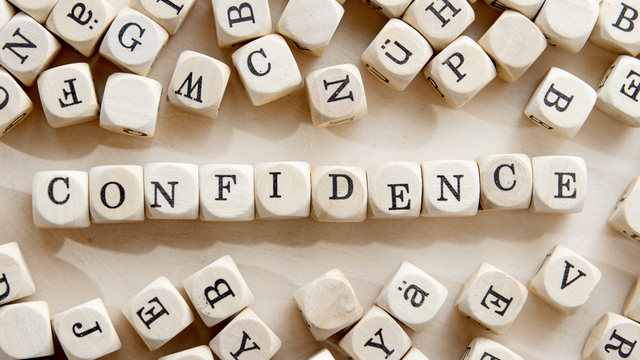
Because I’ve been binge-watching both the 2020 Olympic Games and the new Apple TV series Schmigadoon, I’ve got gold medals and show tunes on my mind. In particular today, I’m thinking about one of my all time favs, The Sound of Music, and the exceptional song “I Have Confidence”.
So let them bring on all their problems
I’ll do better than my best
I have confidence
They’ll put me to the test
But I’ll make them see
I have confidence in me
With each step I am more certain
Everything will turn out fine
I have confidence
The world can all be mine
They’ll have to agree
I have confidence in me
What is confidence?? It’s one of those things that you can’t really put your finger on. It’s a feeling or intuition. When speaking about ourselves, it’s “a feeling of self-assurance arising from one’s appreciation of one’s own abilities or qualities.”
When speaking about someone or something else, it’s “the feeling or belief that one can rely on someone or something; firm trust; a sense of certainty.”
But let’s stick to the notion of confidence in one’s self. To be self-confident, you have to be in the right head space. Because that’s where confidence lives. It is not so much about your physical abilities as much as your mental abilities. And we see this play out in all kinds of settings. We of course want surgeons, soldiers, nurses, first responders and teachers to all be equipped with a good dose of confidence in their skills and abilities. Right? It sort of goes without saying. We not only hope that these people are good at what they do, but that they also hold the belief in themselves that they are good at their profession. Otherwise, that self-doubt would cause their professional performance to suffer. And that could not only be bad, but dangerous to them and lots of the rest of us.
I haven’t been able to find many people who disagree with me on this point – that we count on a lot of people who we want to have, and we assume have, a healthy dose of self-confidence. And we would rather not know when they are having a bad day in that department. And yet we all do. We all have days, weeks (sometimes months or years) where we are convinced that we are imposters. Not as good as we think we are or not who we have convinced the outside world to think we are. We are average at best, and who knows at worst. We all go through this. It seems fairly human. Some of us are able to admit it while others of us are not, but we all experience these moments of self-doubt. Some people get so mired up in these thoughts that it takes them to a dark place, and they need professional help to get back their equilibrium. That too is fairly common.
What has recently brought these issues into the public consciousness was not the breast cancer surgeon who operated on our mom, or the beloved chemistry teacher at our local high school who might have gone through a crisis of confidence. It was a 24-year-old, 4-foot-8-inch tall most decorated gymnast of all time (G.O.A.T.) – a.k.a. Simone Biles.
There has been a LOT written and said about Ms. Biles by everyone and their brother who has a Twitter account or speaks into a microphone. I do not plan to rehash any of that here (although if you are looking for good pieces on this topic, I recommend this and this). But I want to bring this up because this was the kind of unexpected and brilliant communications moment that I live for!
Simone Biles is not the first to bring to our attention that being an elite athlete (particularly the greatest of all time) demands not just physical talent and strength but a mental toughness that most of us cannot begin to comprehend. The difference is that Ms. Biles does not swing a golf club or swim in a pool. When her ability to focus mentally is compromised, she is risking potentially life altering injury.
She had the maturity and personal strength to make the hardest of all decisions under the brightest of lights. But in that moment, she knew herself, her skills and her body. She was not willing to put her teammates outcome or her personal safety at risk to appease the “powers that be” in the Olympics (sponsors, the USOC, pundits, fans and critics). I’ve heard some say she “quit.” Um, what? Someone like Simone Biles doesn’t work their ass of for 5 years and then just quit. She wasn’t just having a “bad day” or wasn’t “overcome by nerves.” Something was seriously wrong. These critics would have understood had she broken a bone. But because they couldn’t see the “break” between her mind and her body, they assumed she was just weak, selfish or a diva.
Simone Biles may very well be the most self-confident person we have ever seen lose their confidence – on the biggest of all stages. Why do I say that? Because the mental health challenge she faced was a loss of confidence. She lost confidence in her ability to get her body to do what her mind intended – the “twisties” as gymnasts call it. But yet she had the amazing self-confidence to communicate extremely clearly — she couldn’t perform to the best of her abilities, so she was going to sit out and give her (our) team a better chance to succeed. She told us she was going to take care of herself and that she’d be fine. And without saying it, she told us we would be fine too, despite our disappointment. Who does that??
I love what Simone Biles taught us and how she communicated during these very unprecedented Olympics. Her story, and what led to this moment for her, assuredly has many facets. Knowing that, I am very thankful for her personal integrity and skill in navigating what must have felt impossible, all with a camera trained on her every move. I am thankful for her self-confidence on full display. And her ability to be a leader; to do what was smart and safe, when she knew it would be unpopular and controversial.
I have confidence
They’ll put me to the test
But I’ll make them see
I have confidence in me
I have confidence in Simone Biles. And all the brilliant young women like her who we have not had the pleasure to meet – yet.
